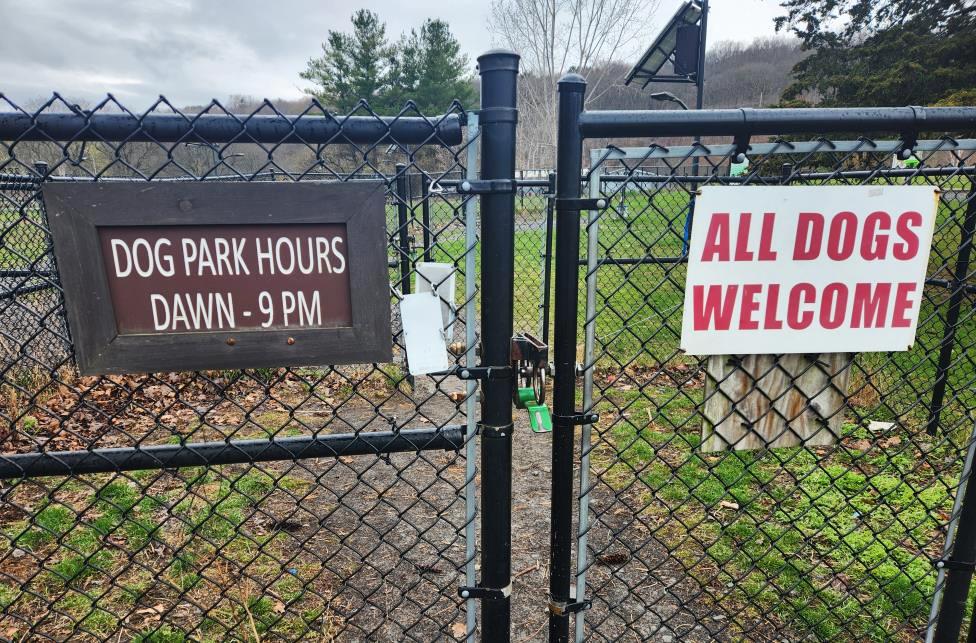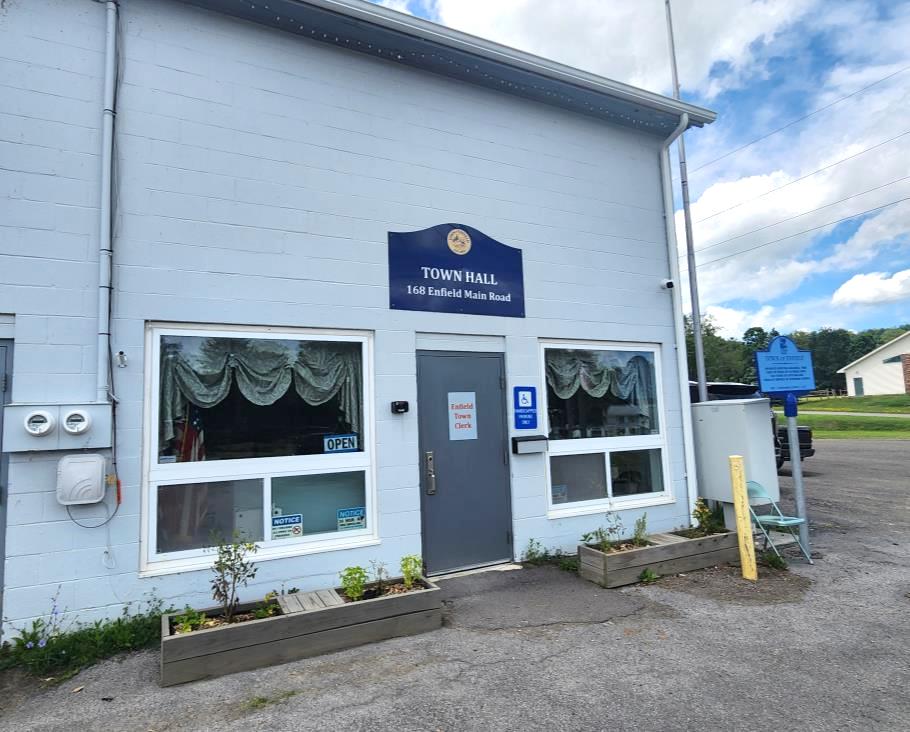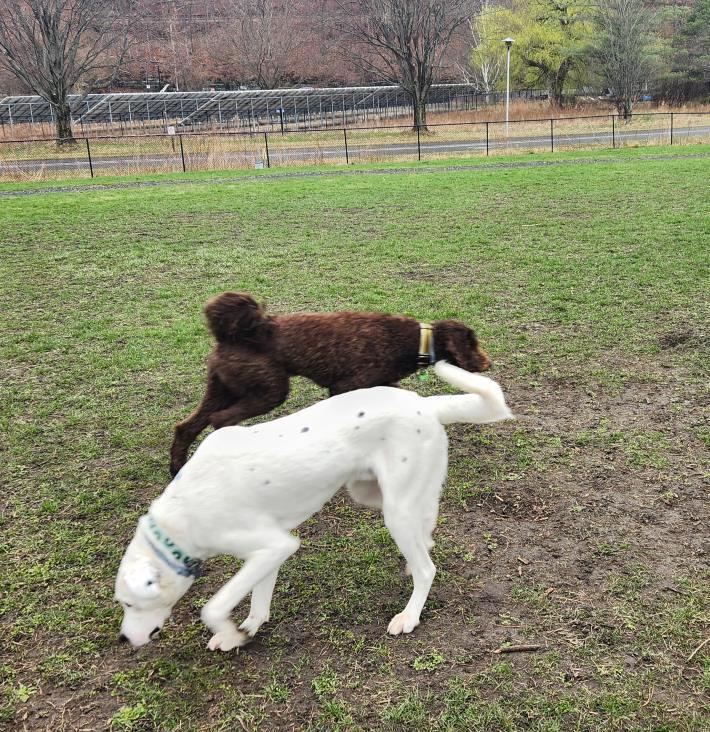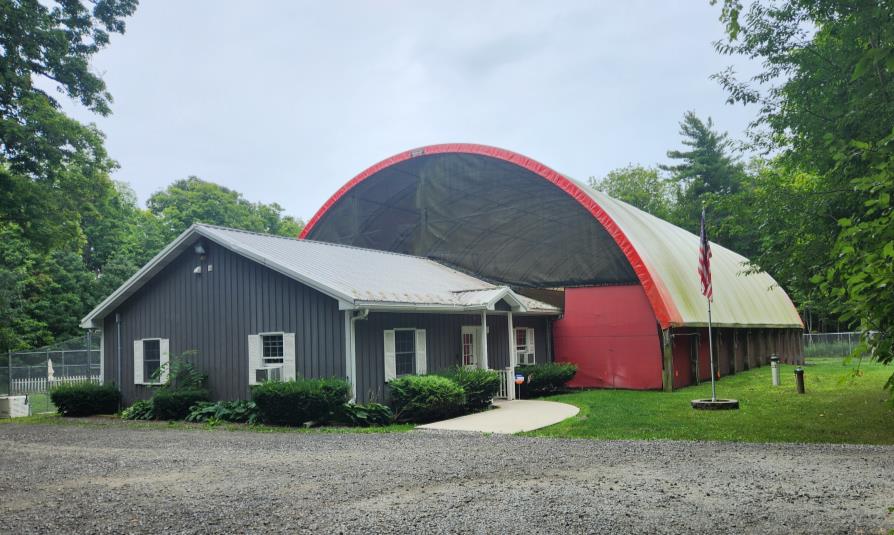Yearlong effort ends amid public grumbles
by Robert Lynch; April 11, 2025
To some, it’s a justifiable response: “C’mon, it’s only a Dog Law. Why did it take you a year to pass it?” Well, it did. And well, it’s also Enfield, where it could be said that the most compelling command to those in power is: “Be careful when you mess with Man’s Best Friend.”

On Wednesday night, April 9th, the Enfield Town Board adopted its revised, long-discussed “Dog Control and Licensing Local Law and Regulations.” It runs 16 pages and consumes nearly 8,500 words. It replaces a pithier, two-page document that an earlier Town Board had passed in 2010. Quite rightly, critics could call this latest, wordy rendering the product of lawyerly bloat.
The Town Board’s vote was unanimous, “I’m torn by this, but I’m going to vote aye,” Councilperson Robert Lynch (this writer) stated as Town Clerk Mary Cornell called the roll. Some two hours later, as the meeting wound to a close, Lynch recanted. He said he’d made a mistake; upon reflection, he should have opposed the law. Too late. It would have passed anyway, of course.
“Have we heard from anybody who actually wants this dog law, other than members of this board and members of the Town administration?” Lynch asked following Wednesday’s close of a two-night public hearing that had spread over two months. On each of those hearing nights, all comments proved negative.
“In my experience, that when people are happy, they don’t comment,” Supervisor Stephanie Redmond replied.
Town Clerk Cornell said she had been visited by residents who’d requested tighter regulation.
The Enfield Dog Law journey began almost one year earlier from its day of adoption. On April 10, 2024, the Town Board’s official minutes state, “Clerk Cornell shared that she would like to include a late fee of $10 for dogs that are renewed more than 30 days late.” The Town Clerk had first only sought a minor change in the fee schedule. That was all.

But the fee schedule was cemented firmly within the 2010 law. And the Town’s legal counsel, Guy Krogh, said there’d need to be a public hearing to impose the late fee that Cornell had proposed. At about the same time, Krogh looked at the old law, said it fell short by modern standards, and recommended a rewrite.
By June, the attorney had brought forth the much more comprehensive Dog Law draft, a version almost identical, word-for-word, to what the Town Board would eventually adopt. In a June 12 memo—a document whose contents must otherwise be considered confidential between the attorney and the Town—Krogh described his draft dog law as a “fully option-loaded Caddy.” He could downsize it to an “Accord” or an “Impala” should the Town prefer it, Krogh qualified. But most Enfield leaders opted to stay with the Escalade.
“This is ridiculous. I’m sorry, but I’m done,” Town Supervisor Stephanie Redmond exclaimed in exasperation 44 minutes into an 80-minute Dog Law Public Hearing February 12th. Redmond retreated after a trio of residents had pummeled her with critical, sometimes repetitious questions and complaints about the proposed law and its reach into dog owner freedom. Redmond stepped aside for a time and let Councilperson Lynch take the questions.
“There are so many other things in my opinion that are more important in this town than dog owners,” Hines Road’s Tammy Alling, a multiple dog owner herself, complained.
“My problem is we’re regulating and regulating and regulating,” Alling continued. “We live in Enfield. This is not Cayuga Heights. This is not Dryden. This is not Lansing. We’re Enfield, for crying out loud. We’re the second poverty-stricken area in Tompkins County. We can’t forget that.”
“Are we fixing something that isn’t broken?” resident Rodger Linton asked, pointing to the proposed law.
“I think we are,” Councilperson Jude Lemke answered, implying that the current law is, indeed, broken, “because there have been situations where our Town Clerk has had people approach about a problem that’s going on with a dog, and we have not had any recourse because our law has not covered those situations as they currently exist.”
It’s an “added layer of protection,” Clerk Cornell described the expanded law. We don’t want to get a “hoarding situation,” the clerk explained.
The February discussion could have gone long into the winter’s night had the Town Board not adjourned the public hearing for two more months so as to move on to other business. The hearing resumed this past Wednesday. It only ran for about a half-hour this time. But Rodger Linton was back in the gallery.
“What do we need it for?” Linton asked. “We went to all this work to get an increase of two dollars,” he said, referring to the higher licensing fees. “But you put a price on the head of dog owners in the town by adopting a whole new bunch of other punishable, finable problems that didn’t exist before.”

“Yes, the initial reason we picked up the law was to look at the fees,” Councilperson Lemke acknowledged. “But we spent a year on and off talking about the dog law, so things came up as we discussed it… that we thought should be addressed, and we addressed that as we went along.”
In truth, the Town Board made very few revisions from the “Caddy” draft that attorney Krogh had handed board members. And just as often as not, such as during a somewhat testy, line-by-line review last July 31, substantive modifications were tossed aside, rather than accepted.
“Whose life is better off because of this new law?” Linton asked at the April 9th hearing.
“The dogs,” multiple Town Board members and Clerk Cornell chimed back.
“I just don’t see the benefit,” Linton rebutted. “It benefits nobody except for the coffers of the Town.”
Linton and others sought parallel, though perhaps irreconcilable, goals: more specificity yet reduced regulation.
“I don’t quite understand,” Supervisor Redmond inquired. “So you want more definitions, but you want it to be less. The reason it grew from two pages to 16 pages is we got much more specific.”
One of the Dog Law’s more intrusive new dictates is one that impacts a handful of dog owners who harbor five or more canines, whether for profit or just because they have a big heart. A five-dog household would newly be considered a “kennel” in the eyes of the law. Under the dog law’s requirements, food at such “kennels” would need to be “kept under cover and in sealed containers,” and animal waste removed so as “to keep the property sanitary.”

In deliberations just prior to the law’s final adoption—as Councilperson Lynch offered a flurry of proposed amendments, many of which never got adopted—the Town Board softened the kennel waste removal requirement from its initial stipulation that “waste be removed daily from the premises in tightly covered containers.”
Clerk Cornell told the meeting that while 29 households harbor three dogs, only three homes harbor between five and nine dogs. That’s apart from the additional five registered purebred breeders, according to the clerk’s licensing data.
One Lynch amendment that did not survive the night was to strip from the proposed law its “Section 13” regulations for “Designated Off-Leash Areas and Dog Parks.”
Enfield does not have a dog park. Supervisor Redmond made clear that no such park is planned. If one were proposed, it would require a separate public hearing. And meeting attendees made it clear they would not want a dog park… ever.
“The dog parks are not working out,” one speaker commented, referencing the dog park in Ithaca.
“I have seen dogs kill other dogs. I have seen people fighting over their dogs,” the commenter claimed. “I have picked up I don’t know how many dead dogs and given them back to their owners.”
Section 13 was apparently boilerplate; language the attorney had cut and pasted from a draft law far more applicable to some other, more urbanized place. Nevertheless, despite the provision’s inapplicability and the public opposition to dog parks in general, the motion to delete the section never moved to a vote for lack of a second. Redmond said she’d prefer keeping options open for a possible dog park in the long-distant future.
Similarly rejected was Lynch’s call for stripping down the bloated law to its barest of bones; slicing away all the surplus regulations and appending the fee changes Clerk Cornell had sought to the old, 2010 law.
And as a final failed amendment, revisiting a provision that had raised emotions at last July’s contentious review session, yet has received scant attention since, the Town Board failed to second and thus cast aside Lynch’s effort to clarify liability rules. The amendment would have made clear that even though the law would provide an “affirmative defense” to a dog owner whose animal attacks another animal—such as a cat—when it trespasses onto the dog owner’s own property, the allowance would not preclude the victim pet’s owner from suing for damages in court.

“I don’t make mistakes often, but I think earlier tonight I did make a mistake, and that was to vote for the Dog Law,” this writer, Councilperson Lynch, said, at the close of Wednesday’s meeting, nearly four hours after the session had begun.
“It would have passed anyway,” Lynch said of the law, “but I thought there had to be additional protections for people who own other domestic animals who may be harmed by a predatory dog.”
After the meeting, Councilperson Lemke, an attorney, emailed this Town Board member to assert that the affirmative defense posture taken within the new law reflects New York case law. Any higher, “strict liability” standard for dog liability, she argued, the courts will not accept.
“I maintain that the law we adopted last night reinforces a “Castle Doctrine” approach to dog ownership, one that goes beyond the legal interpretations of the New York Courts,” Lynch stated in reply to Lemke. “The Board majority appears to accept this position. I do not.”
###

